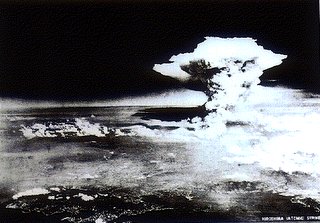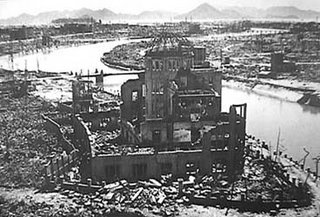Post-Cold War Unilateral Nuclear Warfare
"Anyone can go to Baghdad. Real men go to Tehran."
--Senior Bush Official, May 2003

Outrageous, inhumane, illegal, dangerous, short-sighted and self-destructive--but not unexpected; the ever-indispensible Sy Hersh has yet another groundbreaking report in this week's New Yorker. Here are some choice excerpts:
So they want to stop Iran from getting "a strategic weapon and threaten[ing] another world war," but they are apparently willing to begin one to do so. The eerily-familiar campaign of leaking cherry-picked intelligence reports to generate pro-war buzz has already begun--once again, right before a midterm election. Liberals, the Democratic Party, Christians, and conservatives-who-know-better-than-this-nonsense cannot allow themselves to be shamed, frightened, intimidated or bullied by poll results, "cakewalk"-crying experts on cable news shows, timid campaign consultants, or disingenuous provocateurs' cries of "defeatnik," "traitor," "fifth columnist," "Iran-lover," or "freedom-hater" into sitting silently or supporting yet another ghastly war of choice, spilling more blood in our names and the names of "Peace," "Freedom," "Security," or "the children."
The myopic irony of even considering the fantastic phantasm that some kind of "good outcome" could somehow issue from attacks on Iran--given the delusional rhetoric that led to our current posture in Iraq and our dismal stature in the world community--is staggering. It is truly disturbing that the horrid inhumanity of initiating such a crime as preemptive thermonuclear warfare is even being considered. Then again, the Bush Administration believes that it creates its own reality.
The rest of us can only hope to survive it--or stop it before it is too late.

"Saving Iran is going to be his legacy."
Update:
Then again, in a comment to Digby's post on this subject, R.Porrofatto suggests a different conclusion:
Second update:
Further confirmation and more details are at the Washington Post.
Third update:
Sifu Tweety at the Poorman agrees with R.Porrofatto's intuition:
--Senior Bush Official, May 2003

Outrageous, inhumane, illegal, dangerous, short-sighted and self-destructive--but not unexpected; the ever-indispensible Sy Hersh has yet another groundbreaking report in this week's New Yorker. Here are some choice excerpts:
The Bush Administration, while publicly advocating diplomacy in order to stop Iran from pursuing a nuclear weapon, has increased clandestine activities inside Iran and intensified planning for a possible major air attack. Current and former American military and intelligence officials said that Air Force planning groups are drawing up lists of targets, and teams of American combat troops have been ordered into Iran, under cover, to collect targeting data and to establish contact with anti-government ethnic-minority groups.Be sure to read the whole thing.
. . .
A government consultant with close ties to the civilian leadership in the Pentagon said that Bush was “absolutely convinced that Iran is going to get the bomb” if it is not stopped. He said that the President believes that he must do “what no Democrat or Republican, if elected in the future, would have the courage to do,” and “that saving Iran is going to be his legacy.”
One former defense official, who still deals with sensitive issues for the Bush Administration, told me that the military planning was premised on a belief that “a sustained bombing campaign in Iran will humiliate the religious leadership and lead the public to rise up and overthrow the government.” He added, “I was shocked when I heard it, and asked myself, ‘What are they smoking?’ ”
. . .
In recent weeks, the President has quietly initiated a series of talks on plans for Iran with a few key senators and members of Congress, including at least one Democrat. A senior member of the House Appropriations Committee, who did not take part in the meetings but has discussed their content with his colleagues, told me that there had been “no formal briefings,” because “they’re reluctant to brief the minority. They’re doing the Senate, somewhat selectively.”
The House member said that no one in the meetings “is really objecting” to the talk of war. “The people they’re briefing are the same ones who led the charge on Iraq. At most, questions are raised: How are you going to hit all the sites at once? How are you going to get deep enough?” (Iran is building facilities underground.) “There’s no pressure from Congress” not to take military action, the House member added. “The only political pressure is from the guys who want to do it.” Speaking of President Bush, the House member said, “The most worrisome thing is that this guy has a messianic vision.”
Some operations, apparently aimed in part at intimidating Iran, are already under way. American Naval tactical aircraft, operating from carriers in the Arabian Sea, have been flying simulated nuclear-weapons delivery missions—rapid ascending maneuvers known as “over the shoulder” bombing—since last summer, the former official said, within range of Iranian coastal radars.
. . .
One of the military’s initial option plans, as presented to the White House by the Pentagon this winter, calls for the use of a bunker-buster tactical nuclear weapon, such as the B61-11, against underground nuclear sites. . . . The elimination of Natanz would be a major setback for Iran’s nuclear ambitions, but the conventional weapons in the American arsenal could not insure the destruction of facilities under seventy-five feet of earth and rock, especially if they are reinforced with concrete.
. . .
. . . The lack of reliable intelligence leaves military planners, given the goal of totally destroying the sites, little choice but to consider the use of tactical nuclear weapons. “Every other option, in the view of the nuclear weaponeers, would leave a gap,” the former senior intelligence official said. “‘Decisive’ is the key word of the Air Force’s planning. It’s a tough decision. But we made it in Japan.”
. . .
. . . Late this winter, the Joint Chiefs of Staff sought to remove the nuclear option from the evolving war plans for Iran—without success, the former intelligence official said. “The White House said, ‘Why are you challenging this? The option came from you.’ ”
The Pentagon adviser on the war on terror confirmed that some in the Administration were looking seriously at this option, which he linked to a resurgence of interest in tactical nuclear weapons among Pentagon civilians and in policy circles. He called it “a juggernaut that has to be stopped.”
. . .
The Pentagon adviser questioned the value of air strikes. “The Iranians have distributed their nuclear activity very well, and we have no clue where some of the key stuff is. It could even be out of the country,” he said. He warned, as did many others, that bombing Iran could provoke “a chain reaction” of attacks on American facilities and citizens throughout the world: “What will 1.2 billion Muslims think the day we attack Iran?”
With or without the nuclear option, the list of targets may inevitably expand. One recently retired high-level Bush Administration official, who is also an expert on war planning, told me that he would have vigorously argued against an air attack on Iran, because “Iran is a much tougher target” than Iraq. But, he added, “If you’re going to do any bombing to stop the nukes, you might as well improve your lie across the board. Maybe hit some training camps, and clear up a lot of other problems.”
The Pentagon adviser said that, in the event of an attack, the Air Force intended to strike many hundreds of targets in Iran but that “ninety-nine per cent of them have nothing to do with proliferation. There are people who believe it’s the way to operate”—that the Administration can achieve its policy goals in Iran with a bombing campaign, an idea that has been supported by neoconservatives.
. . .
Any American bombing attack, Richard Armitage told me, would have to consider the following questions: “What will happen in the other Islamic countries? What ability does Iran have to reach us and touch us globally—that is, terrorism? Will Syria and Lebanon up the pressure on Israel? What does the attack do to our already diminished international standing? And what does this mean for Russia, China, and the U.N. Security Council?”
. . .
Michel Samaha, a veteran Lebanese Christian politician and former cabinet minister in Beirut, told me that the Iranian retaliation might be focussed on exposed oil and gas fields in Saudi Arabia, Qatar, Kuwait, and the United Arab Emirates. “They would be at risk,” he said, “and this could begin the real jihad of Iran versus the West. You will have a messy world.”
Iran could also initiate a wave of terror attacks in Iraq and elsewhere, with the help of Hezbollah. . .
The adviser went on, “If we go, the southern half of Iraq will light up like a candle. . .”
So they want to stop Iran from getting "a strategic weapon and threaten[ing] another world war," but they are apparently willing to begin one to do so. The eerily-familiar campaign of leaking cherry-picked intelligence reports to generate pro-war buzz has already begun--once again, right before a midterm election. Liberals, the Democratic Party, Christians, and conservatives-who-know-better-than-this-nonsense cannot allow themselves to be shamed, frightened, intimidated or bullied by poll results, "cakewalk"-crying experts on cable news shows, timid campaign consultants, or disingenuous provocateurs' cries of "defeatnik," "traitor," "fifth columnist," "Iran-lover," or "freedom-hater" into sitting silently or supporting yet another ghastly war of choice, spilling more blood in our names and the names of "Peace," "Freedom," "Security," or "the children."
The myopic irony of even considering the fantastic phantasm that some kind of "good outcome" could somehow issue from attacks on Iran--given the delusional rhetoric that led to our current posture in Iraq and our dismal stature in the world community--is staggering. It is truly disturbing that the horrid inhumanity of initiating such a crime as preemptive thermonuclear warfare is even being considered. Then again, the Bush Administration believes that it creates its own reality.
The rest of us can only hope to survive it--or stop it before it is too late.

"Saving Iran is going to be his legacy."
Update:
Then again, in a comment to Digby's post on this subject, R.Porrofatto suggests a different conclusion:
[T]his may also be a typical tactic of the Bush administration. After floating this balloon, they go ahead and use conventional bombs (which these days are far from conventional) and everyone breathes a sigh of relief at their restraint.
Second update:
Further confirmation and more details are at the Washington Post.
Third update:
Sifu Tweety at the Poorman agrees with R.Porrofatto's intuition:
It may be that they’re genuinely psyched to get some of their nuclear ordnance out there, but it seems more likely to me that the WPE [Worst President Ever] administration is so eager to keep this on the table not because they desperately want to use nukes, but because by keeping nukes on the table they can reframe the discussion as “should we nuke Iran,” as opposed to “should we launch a massive bombing campaign in Iran”. It’s nuclear brinksmanship, but purely domestic, and purely political. Even if that’s not the case, of course, it very much behooves those of us who aren’t certifiable warmongering fascist &c. &c., who want to stop this, to focus on the reprecussions of an Iranian campaign generally, rather than specifically a nuclear blast: the truth is, if you’re trying to start a global, clash-of-civilizations style war with, and betweeen, the entire Islamic world, invading Iran is a pretty awesome way to do it.

0 Comments:
Post a Comment
<< Home